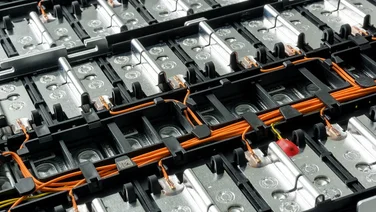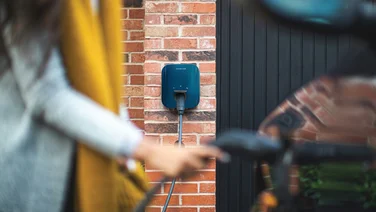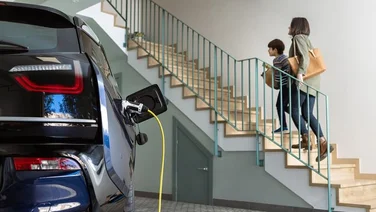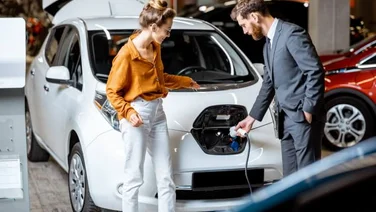- The fastest charging electric car is the Hyundai IONIQ 6 Long Range 2WD
- It can go from 10% charged to 80% in just 16 minutes
- Several fast-charging cars are available for under £30,000
When you’re deciding which electric car to buy, you want one you can charge quickly and reliably. Investing in a powerful EV charger can help, but choosing the right car is also important.
We’ve ranked the fastest charging electric cars in the UK, and explained how these miracles of manufacturing can take on charge so rapidly.
Want to join the green revolution by getting an electric charging point of your own? Just fill in this short form, and our trusted installers will send you free quotes.
Get free EV charging point quotes
Answer a few quick questions, and our trusted installers will send you bespoke EV charging point quotes – for free.

The fastest charging electric cars in the UK
| Position | Model | Rapid charge speed (mph) | Time to charge from 10% to 80% (mins) |
|---|---|---|---|
| 1 | Hyundai IONIQ 6 Long Range 2WD | 770 | 16 |
| 2 | Porsche Taycan Plus | 720 | 17 |
| 3 | Hyundai IONIQ 6 Long Range AWD | 700 | 16 |
| 3 | Porsche Taycan 4S Plus | 700 | 17 |
| 5 | Porsche Taycan GTS | 690 | 17 |
| 6 | Porsche Taycan Plus Sport Turismo | 670 | 17 |
| 7 | Kia EV6 Long Range 2WD | 660 | 16 |
| 8 | Kia EV6 Long Range AWD | 650 | 16 |
| 8 | Porsche Taycan 4S Plus Sport Turismo | 650 | 17 |
| 8 | Porsche Taycan GTS Sport Turismo | 650 | 17 |
| 8 | Porsche Taycan 4S Cross Turismo | 650 | 17 |
| 8 | Porsche Taycan 4 Cross Turismo | 650 | 17 |
| 8 | Audi e-tron GT quattro | 640 | 17 |
| 14 | Porsche Taycan | 630 | 17 |
| 14 | Hyundai IONIQ 5 Long Range 2WD | 630 | 16 |
| 14 | Genesis GV60 Premium | 630 | 16 |
| 14 | Porsche Taycan Turbo | 630 | 17 |
| 18 | Hyundai IONIQ 5 Long Range AWD | 610 | 16 |
| 18 | Genesis GV60 Sport | 610 | 16 |
| 18 | Porsche Taycan Turbo Sport Turismo | 610 | 17 |
| 18 | Porsche Taycan Turbo Cross Turismo | 610 | 17 |
| 18 | Audi e-tron GT RS | 610 | 17 |
| 23 | Porsche Taycan 4S | 600 | 17 |
| 23 | Kia EV6 GT | 600 | 16 |
| 23 | Porsche Taycan Turbo S Sport Turismo | 600 | 17 |
| 23 | Porsche Taycan Turbo S | 600 | 17 |
| 27 | Mercedes EQS 450+ | 590 | 28 |
| 27 | Genesis GV60 Sport Plus | 590 | 16 |
| 27 | Porsche Taycan Turbo S Cross Turismo | 590 | 17 |
| 30 | Porsche Taycan Sport Turismo | 580 | 17 |
| 31 | Porsche Taycan 4S Sport Turismo | 560 | 17 |
| 32 | Genesis G80 Electrified Luxury | 5 50 | 21 |
| 33 | Genesis GV70 Electrified Sport | 530 | 17 |
| 34 | Mercedes EQS AMG 53 4MATIC+ | 520 | 28 |
| 35 | BMW i7 xDrive60 | 470 | 28 |
| 36 | Tesla Model 3 Long Range Dual Motor | 460 | 27 |
| 37 | Hyundai IONIQ 5 Standard Range 2WD | 450 | 17 |
| 37 | BMW i4 eDrive40 | 450 | 27 |
| 39 | Audi Q8 e-tron Sportback 55 quattro | 440 | 31 |
| 39 | Mercedes EQE AMG 53 4MATIC+ | 440 | 28 |
| 39 | Tesla Model 3 Performance | 440 | 27 |
| 42 | BMW iX xDrive 50 | 420 | 31 |
| 42 | Polestar 2 Long Range Single Motor | 420 | 27 |
| 42 | BMW i4 M50 | 420 | 27 |
| 42 | Tesla Model Y Long Range Dual Motor | 420 | 27 |
| 46 | Audi Q8 e-tron 55 quattro | 410 | 31 |
| 47 | Mercedes EQE 350 | 400 | 33 |
| 47 | Mercedes EQE 300 | 400 | 33 |
| 47 | BMW iX M60 | 400 | 31 |
| 47 | Polestar 2 Long Range Dual Motor | 400 | 27 |
Data sourced from EV Database, correct as of February 2023
The fastest charging electric car in the UK is the Hyundai IONIQ 6 Long Range 2WD, which can be charged at a rate of 770 miles per hour (mph).
It takes just 16 minutes to charge the Hyundai IONIQ 6 Long Range 2WD from 10% to 80%, which is frankly astounding.
However, you will need a 350 kW ultra-rapid charger to achieve this speed, which isn’t available for domestic use. You can only find them at public charging stations.
The Porsche Taycan Plus is the second-fasting charging electric car, at 720 mph.
There are 18 models of the Porsche Taycan on this list of the top 50 fastest charging cars, but this is the quickest.
Why are some electric cars faster to charge?
Some electric cars are faster to charge because they can use more advanced chargers, have a higher maximum charging capacity, and come with a smaller-than-average battery.
Let’s dive into each of those factors, in turn.
Access to better chargers
Almost all fully electric cars can use 43 kW rapid chargers – unlike hybrids and plug-in cars – which puts them on a higher level than most.
However, there’s another level, and it belongs to the elite vehicles.
There are currently around 200 electric cars that can use the 350 kW ultra-rapid chargers being rolled out in the UK, which pump DC electricity straight into your vehicle.
Higher maximum charging capacity
To take full advantage of these 350 kW ultra-rapid chargers, electric cars must be able to accept charge at a much quicker rate than usual.
After all, if they can’t at least reach beyond the speeds available to them at 50 kW rapid chargers, there’s no point in using ultra-rapid charging stations, as they’re usually more expensive.
No electric car can actually reach 350 kW yet – though it’s just a matter of time – but they get pretty high.
The Hyundai IONIQ 6 Long Range 2WD can reach 233 kW, and maintains an average of 200 kW for most of its charging cycle.
Compare that to Hyundai’s Kona 39 kW, which can only reach a maximum charging speed of 44 kW – and therefore takes three times as much time to charge half as big a battery.

Smaller battery
The other factor to consider is an electric car’s battery. The smaller its capacity, the quicker you’ll be able to charge it to 80%, everything else being equal.
That’s why you should always check an electric vehicle’s range before signing on the dotted line.
However, you can charge an electric car extremely quickly without a small battery.
After all, only 11 of the fastest charging electric cars available in the UK have a bigger battery than the quickest of them all, the Hyundai IONIQ 6 Long Range 2WD.
Are fast-charging electric cars cheaper?
Fast-charging electric cars are not cheaper; they’re more expensive.
You’ll pay at least £43,000 for one of the fastest charging electric cars in the list above, and it’s much more common to find one that costs north of £100,000.
There are some electric cars that cost under £35,000 and can reach charging speeds over 100 kW, such as the Mazda MX-30, Mini Electric, and Nissan Leaf – but not many.
The price of fast-charging electric cars puts them out of reach for many, but that won’t always be the case.
With costs coming down all the time, fast-charging cars are set to become widely affordable in a matter of years.
However, even if fast-charging cars were free, it’s no guarantee people would want them, as our 2023 National Home Energy Survey showed. It revealed that just 55% of Brits would want a free electric car, which is possibly down to misconceptions about charging point infrastructure and EV range.
Can any electric car use a fast or rapid charger?
Most electric cars in the UK can use fast or rapid chargers, as they almost all come with the necessary Type 2 socket.
And if you have an electric car with a CCS socket, you can also use ultra-rapid chargers.
However, check your maximum charging capacity before you rush to use a rapid or ultra-rapid charger.
If your electric car can’t reach a charging speed over 11 kW, for example, then there’s no need to try out a 22 kW charger. 11 kW is your car’s ceiling, whatever charger you use.
For more information, read our Complete Guide to Electric Vehicle Charging.
Will electric cars be faster at charging in the future?
Electric cars will definitely be faster at charging in the future.
350 kW chargers have only just hit the UK, but they’ll become a common sight in the next few years, as an increasing number of electric cars are developed with charging capacities above 150 kW.
And in the not-too-distant future, we’ll see an electric car come out with a 350 kW charging capacity.
This will, in turn, prompt engineers to develop chargers with higher speeds, which will set a charging capacity target for car manufacturers – and this virtuous cycle will continue.
FAQs
Can you charge an electric car in 15 minutes?
You can charge the fastest charging electric cars from 10% to 80% in 16 or 17 minutes.
This is only achievable with 350 kW chargers, which are still rare in the UK – but their popularity is set to skyrocket.
A standard electric car using a 7 kW charger will charge up 1.75 kWh in 15 minutes on average, which will allow it to travel 5.5 miles.
Is it okay to charge an electric car every night?
You shouldn’t charge your electric car every night if you can avoid it.
Try to charge only when necessary, rather than fitting it into a routine, as daily charging can reduce your car battery’s lifespan and even its range.
Thankfully, most modern electric chargers can be programmed to only start charging when the battery falls below a certain level, and to stop when they reach a specific amount.
Can electric cars go 500 miles on one charge?
No electric car currently available in the UK can go 500 miles on a single charge.
However, Dutch company Lightyear is producing the Lightyear 2, an electric car it promises will have a range of 500 miles.
And with electric vehicle range levels now peaking at 395 miles, it’s only a matter of time before more cars follow suit.
How long does a 7kW charge take?
It takes just under 10 hours for a 7 kW charger to fill the average electric car’s battery.
However, it only takes 8 hours to reach 80%, which is the ideal amount of charge to hit.
The length of a 7 kW charge will always depend on the size of your electric car’s battery, though.
Next steps
You now have all the knowledge necessary to buy the electric car of your dreams – the one you can charge in next to no time.
Your best next step is to consider getting an electric charging point for your home.
The average electric car driver can cut their charging costs by 42% by using their own charger. Just fill in this short form, and our trusted installers will send you free quotes.






